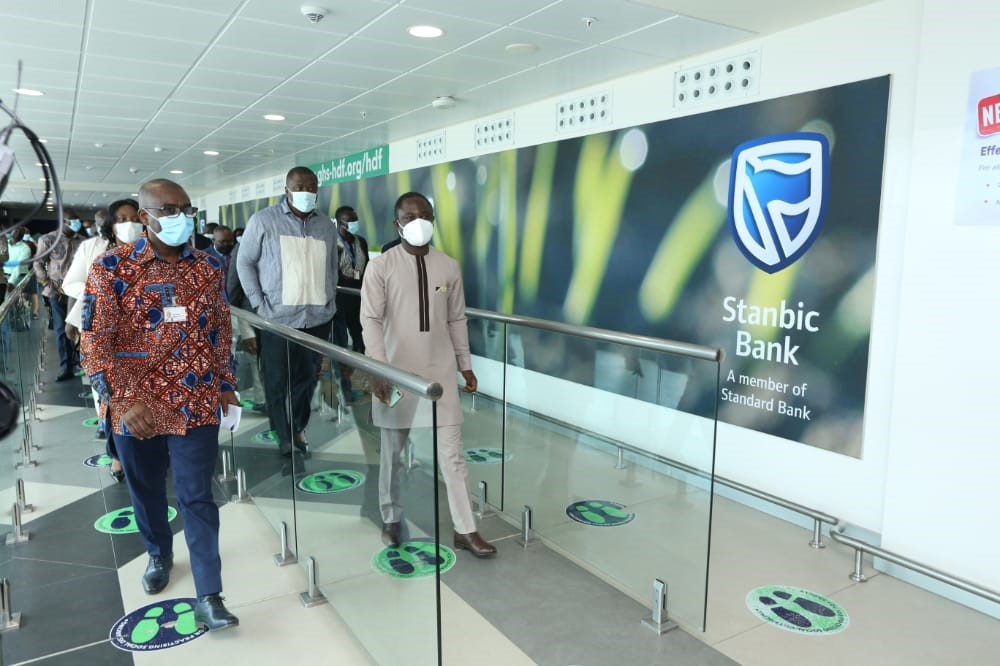Manager of the COVID-19 test facility at the Kotoka International Airport (KIA), Frontier Health Service (FHS), has said that one of the highest costs on its operational budget is the regular reconfiguration of machinery with new COVID-19 variants detected anywhere in the world.
According to the company, the move is critical to their operational guidelines as they are expected to detect and alert the Ghana Health Service (GHS) through the Port Health Unit at KIA of any new variant that enters the jurisdiction, to ensure the country stays ahead of the COVID-19 pandemic and puts in place effective measures to fight it.
Managing Director of the company, Dr. Kudzo Seneadza, in an interview with B&FT said FHS has been diligent with its work at the KIA – producing test results in 30 minutes and so far being able to “pick up all the variants” the country has encountered. He spoke to this Paper when the parliamentary select committee on health visited the COVID-19 testing facility, to gain first-hand experience of its operation and clarify some issues which have cropped up in recent times.
Dr. Seneadza said FHS has put in robust measures to ensure COVID-19 cases that are imported into the country are quickly detected and persons detained and treated to prevent the virus from spreading; hence the huge investment made at the country’s main airport.
“FHS invests heavily into regular updates of our system. We are in touch with our manufacturers, and whenever there are new variants they run the system checks and update it; that is one of our major costs. We put in a lot of effort to ensure that we get every new variant and configure it into our system. So far, it has been safe and been able to pick up all the variants,” Dr. Seneadza said.

Currently, a few cases of the UK variant as well as that of South Africa have been recorded at the airport.
But there have been concerns about the quality of tests at the KIA, as some health experts believe a PCR (polymerase chain reaction) test would give a more accurate result than the antigen tests (frequently referred to as a rapid test) being conducted by FHS at the KIA.
Director-General of the Ghana Health Service (GHS), Dr. Patrick Kumah Aboagye who was also part of the tour, explained that the nation is confident in the work being done by FHS and the decision to have them conduct antigen tests at KIA is the best.
“Antigen tests pick up the disease when it is very early while PCR may miss; and that is why KLM says four hours before you fly, even with a negative PCR, they request you to do an antigen test; they deem it more sensitive to get the disease at the early stage.”
He added that to be double sure of the variants entering the country, a complete genome sequencing is done on all positive cases recorded at the KIA.
“Apart from detaining all persons who test positive at the airport, sequencing is done on every positive test so we can be able to pick up any new variant. We are also doing random sequencing from labs to see the kinds of variants we have in this country. I want to say that with the antigen test being done at the KIA, the FDA has done a test between that and PCR and it is very comparable.”
GACL
Managing Director of the Ghana Airport Company Limited (GACL), Yaw Kwakwa, expressed delight with the collaboration the nation has had with airlines – saying they have contributed to ensuring the reduction of imported cases into the country.
Select Committee
Chairman of the parliamentary select committee on health, Nana Ayew Afriyie, and his ranking member, Kwabena Minta Akandor, were impressed with the processes FHS, Port Health Services and the GACL have put in place to help fight the pandemic at KIA. Mr. Akandor is of the view that the current pricing wherein Ghanaians are charged US$50 for the test should be further reduced.










